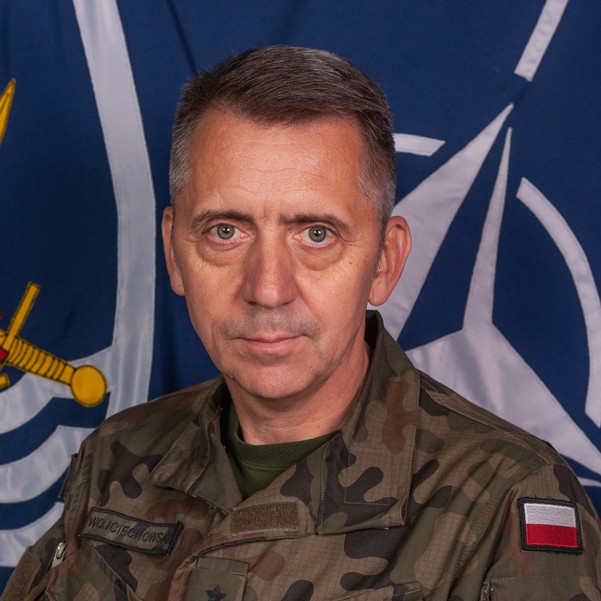Interview with weapon general Sławomir Wojciechowski, commander of the Multinational Corps Northeast in Szczecin - Nobilis Media
Main menu:

The Baltic Sea is the key to Central Europe's security
Interview with weapon general Sławomir Wojciechowski, commander of the Multinational Corps Northeast in Szczecin.
The National Security Strategy of the Republic of Poland 2020 was signed by President Andrzej Duda. In its chapter on the issue of state resilience and universal defense one can see a strong indication of the requirement for a thorough reform of the current civil protection and civil defense system. Is NATO prepared to combat threats related to epidemiological threats?
- By its very nature and purpose, NATO has never been created to combat epidemic threats. However, it is prepared to respond to crises, and this is undoubtedly the presence of a large-scale epidemic threat. A team at NATO Command level is currently being set up, which, on behalf of the Secretary General and NATO Force Commander, coordinates actions to support countries with NATO funds. SACEUR (Supreme Allied Commander Europe) has been appointed as the main coordinator of these activities.
The new National Security Strategy of Poland 2020 also draws attention to the continuing threat from Russia. Are Russian forces in the Kaliningrad District a challenge to the security of Central Europe?
- Yes. Especially with regard to the maneuvering and ballistic missiles deployed in the Kaliningrad District, which have sufficient range to potentially affect most European capitals. The very presence of this type of offensive is a challenge for any military planner.
What elements of Russian hybrid activities are visible in Central Europe?
- If we assume that the so-called "hybrid operations" include the use of non-military means for military purposes, or military means for peacekeeping purposes, such activities include, for example, the deployment of ISKANDER missiles in the Kaliningrad District, the installation of anti-ship missiles capable of affecting hundreds of miles deep into the Baltic Sea, or the deployment of state-of-the-art anti-aircraft guns, whose scope covers the area of many NATO countries. On the other hand, we have coordinated activities in the information space, thematically and problem-oriented focused on the specificity of individual countries. In the case of Lithuania and Latvia, the presence of NATO forces in these countries is used, in the case of Poland the object is historical memory, and in the Czech Republic we have another "monument conflict". There are more elements known from the journalistic name "hybrid war" if we include Ukraine in our considerations. If we assume that the goal of these activities is to undermine cohesion among the countries of the region, mainly NATO and European Union countries, then demonstrative activities under COVID-19 should also be included, as in the case of Italy.
What threats do you foresee on the eastern flank of the Baltic Sea?
- From a military point of view, the biggest challenge could be a sudden military operation against one of the Baltic States, aimed at creating a fait accompli (fait accompli). In this case, time and facts work to the detriment of both the Baltic States and the entire Alliance. No less dangerous scenario may be the unpredictability of the fate of the Republic of Belarus and its relations with Russia.
What significance does the Baltic Sea have for NATO and European security?
- The Baltic Sea is of key importance due to the fact that it is a direct base for NATO countries and operational depth. It is a place of direct contact with NATO's largest military competitor in Europe. Currently, one of the largest intensities of military airborne and reconnaissance operations occurs here. The Baltic Sea and the entire region is one of the priority places in crisis and defense allied concepts.
What is the role of the CSFU in the Baltic Sea in a crisis?
- As a result of the evolution of the NATO concept, WKPW acts as the Land Component Command. Thus, in crisis situations, it will cooperate closely with the components of: the sea, air and NATO Special Forces. Due to the coastal nature of the area, where the VCC can potentially conduct operations with subordinate units, the Baltic Sea is a key element in the success of land operations. Bearing in mind the need to secure the shoreline covering about five thousand kilometers, as well as to ensure freedom of navigation on the Baltic Sea, the corps is prepared to cooperate with its counterpart at sea. We assume that the possibility of fire support and coordination of air operations from the Baltic Sea will be of great significance. In addition, we anticipate that we will be the element supported by other components.
How do you assess the general preparation of the Polish Navy forces for operations with the CCI and NATO in the Baltic Sea?
- In practice, the North-East Corps does not conduct any coordination activities with the Polish Navy in the Baltic Sea. MW RP does not conduct independent maritime operations that could be used by the corps. A separate problem remains the question of whether this is the result of lack of ability or rather lack of ability is the result of a lack of ambition and aspiration in this regard. At present, the partner with which the corps has established cooperation is the Baltic Maritime Component Command operating from German Rostock.
Interviewed
Cdr. Dir. Artur Bilski

CEO of think tank Nobilis Media
mobile: +48 512 488 229 NIP: 851-310-21-12 e-mail: biuro@nobilismedia.pl |nobilismedia.pl
___________________________________________________________________________________________________________________________________

Fast contact:
mobile +48 512 488 229
e-mail: biuro@nobilismedia.pl

The account number for orders:
Name of bank: BNP PARIBAS BANK OF POLAND
account nr: 79 1600 1260 0004 0907 3757 5001

Contact details:
Nobilis Media sp. z o.o.
ul. Kopańskiego 19/21. 71-050 Szczecin POLAND
NIP: 8513102112













